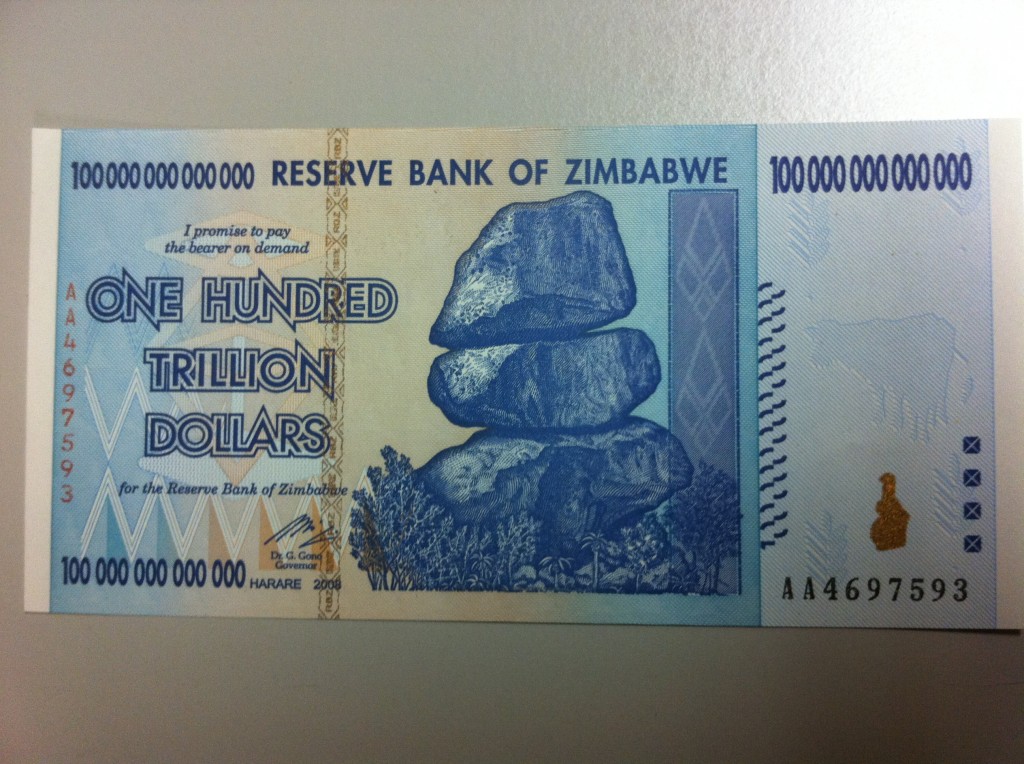Control Hoard Your Cash
Cash is a bad investment, right? Not as bad as penny stocks, perhaps, or California muni bonds, but certainly not much better.
Besides, can you even call holding cash “investing”? Does it fit the definition of using money to generate potential profitable returns?
It can, when deflation happens.
Simply spend enough time on this planet, and you’ll be conditioned to believe that prices and wages inevitably rise- and that what a dollar bought a year ago, it’ll buy slightly less of today.
2010 is an outlying economic year for many reasons, not the least of which is the possibility/certainty of deflation.
Well, that and the gargantuan government spending. Our apologies if we used the word “gargantuan” in a recent post: we’re running out of adjectives that denote bigness. According to the economists at the Bureau of Labor Statistics (which spends an average of $2 per taxpayer per year), the consumer price index fell .1% last month, .2% in May, and .1% in April. Those numbers look miniscule, don’t they? Harmless, even. But keeping in mind that the numbers are several, and that they determine a trend, it might be time to start worrying. It’s hard to draw too many conclusions when the BLS only ratiocinates to one decimal place, but cumulatively, the above numbers tell us that prices have fallen somewhere between 2.5% and 5.4% in a mere 3 months.
Great news for spenders. Rotten news for savers. If that 3-month average were to maintain itself for a year, we’d be looking at a 20% decline in prices.
So what’s the downside to this? You’re complaining about lower prices? God, you really are a killjoy. You probably complain about how sweaty things get during sex, too.
It’s not that simple. Prices and wages usually move in lockstep.
So things are neither better nor worse than usual, then.
Not quite. Say you have a long-term obligation, like a 30-year fixed mortgage. One of the features people like about mortgages that last so long is that by the time you get to the end of the term, the payments will be tiny. They’ll be as large in nominal terms as they are today – fixed rate means if you pay $1000 a month in Year 1, you’ll pay $1000 in Year 30.
Go back to 2005, when annual inflation was close to 4.0%. That’s pretty close to the historical average, maybe a little higher. Say your monthly payment was $1000. If prices rose at 4% throughout the term of your loan, the final payment would be the equivalent of only $321 in constant dollars.
When deflation happens, those payments get progressively harder to make, not easier. During deflation, it’s great to be owed money, less great to owe it. Extended deflation makes banking less viable as an industry. If prices are dropping 20% annually, bank rates have to lower accordingly. That 1-year CD that pays barely 1% in nominal terms thus pays 21% in real terms. Banks aren’t in the habit of throwing money away, which means they’ll stop offering anything other than super-risky loans. If you can keep money in an ammo box buried in your backyard, and enjoy a real rate of return of 20%, banks outlive their usefulness.
A little inflation isn’t all that bad. You could almost argue that it’s crucial for a healthy economy, in that it gives people an incentive to lend and borrow (the latter in hopes of larger returns, the former with the comfort of guaranteed returns.) Deflation isn’t exactly a sign of a robust economy. Again, it usually means wages are decreasing on average, which upon further examination often means that wages are staying the same, just the number of people employed is decreasing, thus lowering the mean. The latest sustained period of deflation in this country’s history was from 1930 to 1933. Go ask your great-grandparents how much fun it was to escape the Great Plains while John Steinbeck wrote books about them and Woody Guthrie sang songs about their plight.
Thanks for the history lesson. How does this help me now?
Get out of that dying industry that you work in, where your shaky paycheck is sustained at the whim of your employer.
If you’re at the point where you’re looking at passive income to supplement or outperform your active income, a) nice going and b) don’t get locked into modest rates. Instead of a conservative money-market account, see what your bank is offering in terms of certificates of deposit. Don’t be shy about shopping around, either: there’s no rule that says you have to keep all your accounts at the same bank. In fact, almost no rich people do. Use the CD ladder technique, which manages to get your entire investment to pay long-term returns even though you’re only in it for the short term.
You want more details on that? You can wait for it to find its way into the rotation as our weekly free book excerpt, but by then the economy could be riding a hyperinflationary thermal for all we know. Or you can one-click your way here.
**This post was featured in Canajun Finances’ Best of Money Carnival #61.**
**This post is featured in the Carnival of Personal Finance #267**




